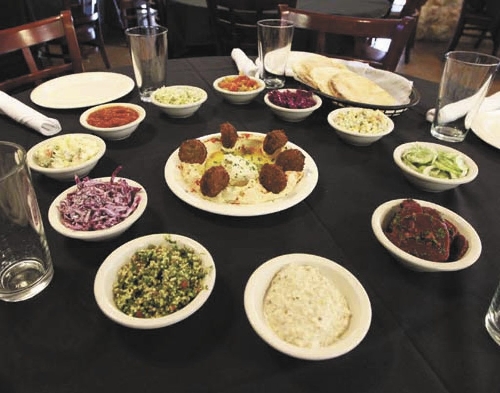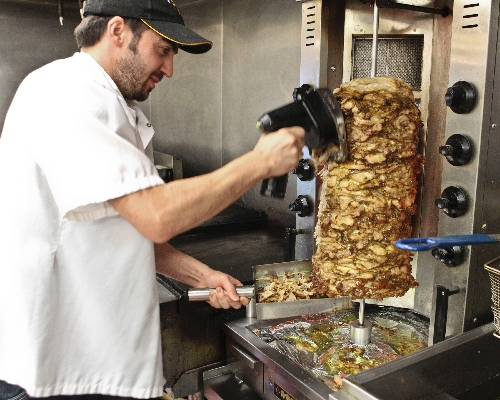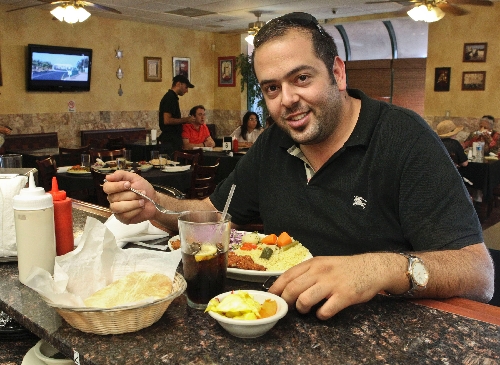Kosher, halal options around valley slowly increasing




Most of us, given the budget and circumstances, can dine out wherever we want whenever we want, the only compromises generally related to – well, budget and circumstances.
For members of the Muslim and Orthodox Jewish communities, meals out are not quite so easily obtained, but the choice of restaurant is pretty simple: for Orthodox Jews, a kosher restaurant; for Muslims, a halal restaurant.
"Someone who truly keeps kosher would not go into a nonkosher restaurant to eat," said Rabbi Shea Harlig of Chabad of Southern Nevada.
When Harlig moved to Southern Nevada in 1990, his options were limited. Although one kosher restaurant was in the process of opening, none operated in the valley at the time.
"We always ate at home," Harlig said.
Currently, the region has seven kosher restaurants and two more are in the process of opening, he noted.
Harlig said that while it may appear that a nonkosher restaurant follows all of the basic guidelines of a kosher establishment, there’s no way for the devout to know that none of the ingredients came from nonkosher sources, or that a knife or countertop has not been used for nonkosher foods.
And, since meat and dairy are, by Jewish law, not to be mixed, kosher restaurants serve either meat or dairy products, but never both. Which means, for example, you’ll never find a kosher pepperoni pizza. (And either can sell foods that are considered "neutral," such as fin fish.)
"The trickier part for us is to make sure to always get kosher meat," Harlig said. "We have to have constant supervision. The certifying agency (which in the valley is almost exclusively Chabad of Southern Nevada) wants to make sure that the people who supply really deliver what they claim." Otherwise, he said, "the consumer at the end will not know if the meat is really kosher or not."
To that end, kosher restaurants must each have a full-time person on staff, called a mashgiach (Hebrew for "supervisor") who is paid by the restaurant but supervised by the certifying agency. The same, Harlig said, is true of supermarkets that sell kosher meats, such as Albertsons at 2550 S. Fort Apache Road and Smith’s at 2211 N. Rampart Blvd. (Supermarket mashgiachs are the only employees who can access the kosher foods sold in their stores.)
Dairy restaurants don’t need to have full-time supervision. "We just have people who go in and out," tantamount to a health-department inspector, Harlig said.
The basic tenets are that Orthodox Jews may eat only animals that have a split hoof and chew their cud, which means no pork or rabbit. They can eat only sea products that have fins or scales, so no shellfish. The animal is slaughtered in a humane, ritual fashion, and immediately drained of blood.
"The other difficulty," Harlig said, "is some vegetables have more bugs than others – things that would be accepted by the health department, but that we wouldn’t be able to eat." The mashgiach will check leafy vegetables with a lightbox, Harlig said, to be sure no insect is overlooked.
Muslims, too, have dietary restrictions dictated by their religion. But while only the most observant Jews traditionally keep kosher, Aslam Abdullah of the Islamic Society of Nevada said all observant Muslims follow halal guidelines, which begin with four categories.
"The most important part is that we basically are supposed to eat only those items that have been prescribed by our religion in our book," Abdullah said. "In that respect, what is important is that we do not consume anything or any product of swine or pig. We do not have the meat of the dead animal. We do not consume blood, and we do not have anything that is offered to a deity or idol other than God himself."
Then, Abdullah said, comes what he calls "the second stage," guidelines on how animals are prepared for human consumption. They must be slaughtered as quickly as possible in order to minimize pain, and the blood must be drawn out. Certain parts of the body, such as the intestines, cannot be eaten.
"What is important is that we dedicate the killing or slaughtering to God, doing it in the name of God," Abdullah said.
He said Muslims must be careful about eating things such as gelatin, which may contain elements of the pig. An exception, he noted, is medications that may contain gelatin.
"In a lifesaving situation one is allowed to break rules."
Abdullah said the "great majority" of Muslims in Southern Nevada adhere to the dietary requirements, but there is some difference of philosophy. Some Muslims, he said, willingly consume foods that have been prepared by non-Muslims, provided the strictures are respected.
"One – more literal – group would not consume anything that is prepared by non-Muslims." A third segment, he said, will consume kosher food because the guidelines are similar.
"Muslim restaurants that serve cooked food, when they say halal, it means that not only are they taking care of the four categories, but making sure that the food they are serving was slaughtered by a Muslim," Abdullah said.
But this may come as a surprise to non-Muslims: Abdullah said some outlets of fast-food chains such as Church’s Chicken and KFC keep halal food on hand, to be served on request. That’s more common in parts of the country with large Muslim populations, he said, but he has found a couple of cases in Las Vegas.
Amnon Fachar, owner of the Jerusalem Grill, 4825 W. Flamingo Road, has had kosher restaurants in Las Vegas since 1998.
"I prefer to have a kosher restaurant," he said. "My family keeps kosher. Consciously, I can’t give nonkosher food to Jewish people who come to me.
"I feel better about myself. I serve the community. It’s very important to me. I feel I’m doing something good."
But Fachar estimated that about 50 percent of his customers are Orthodox Jews.
"I used to be a soldier most of my life," Fachar said. "I have a huge pleasure here to see so many types of people sitting together. I’ve had Muslim customers, I’ve had Christians, I’ve had Jews. It’s incredible to see them sitting at the same table, as friends."
Contact reporter Heidi Knapp Rinella at hrinella@reviewjournal.com or 702-383-0474.
Find a restaurantFollowing are some kosher and halal restaurants in Southern Nevada. This is not intended as a complete list.
Kosher
Adar Pizza, 318 W. Sahara Ave.
Big Dragon, 4145 S. Grand Canyon Drive
Haifa Restaurant, 855 E. Twain Ave.
Jerusalem Grill, 4825 W. Flamingo Road
Panini Cafe, 2521 S. Fort Apache Road
Sababa Grille & Restaurant, 3220 S. Durango Drive
Shawarma Vegas, 2521 S. Fort Apache Road
Halal
Flame Kabob, 1405 E. Sunset Road
Kabob Express, 4912 S. Eastern Ave.
Kabob Korner, 507 E. Fremont St.
Mint Indian Bistro, 730 E. Flamingo Road
Saffron, 3230 E. Desert Inn Road
Taj Palace Indian Cuisine, 9530 S. Eastern Ave.












